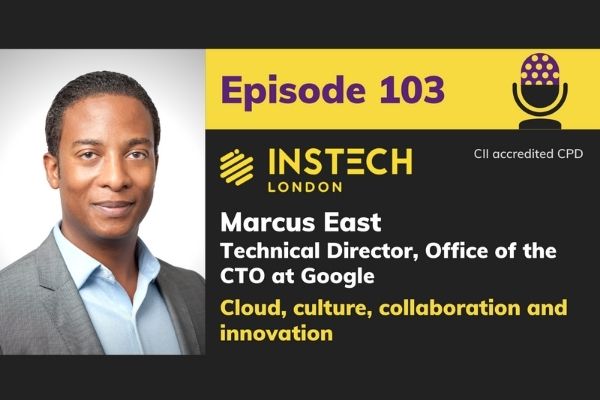Google’s products are playing an increasingly important role helping insurance companies innovate and grow. There are also lessons for everyone in how the company has developed a culture to keep its own innovation fresh and relevant.
Marcus East, Technical Director, Office of the CTO at Google, joins Matthew on Episode 103 to explain how Google is driving change in the industry, and share some fascinating insights into Google’s culture of innovation.
Talking points include:
- Lessons on the role of culture in fostering innovation in within large companies
- The future of AI and Machine Learning
- Advice for selecting cloud partners
- Case studies from the UK and the US
- Support for start-up and early-stage companies
- Where Google sees the biggest opportunities in supporting insurance companies
Look out for our future Live Chat discussions with Marcus and his colleagues from the Office of the CTO.
If you like what you’re hearing, please leave us a review on whichever platform you use, or contact Matthew Grant on LinkedIn.
Sign up to our newsletter for a fresh view on the world every Wednesday morning.
Cloud, culture, collaboration and innovation – Episode 103 highlights
Matthew: Marcus, You’ve had a fascinating career. Can you describe your career journey?
Marcus: There are two parts to my career. There is the tech part. I spent six years at IBM and four years at Apple, where I worked on many of the products Apple uses to sell its products and services to consumers through its website and e-commerce platform.
At Google, the other half of my brain is more focused on how to use technology to do good for the world and deliver real value. That’s what led me to Comic Relief, and one of the things it taught me is that the potential for technology to transform exists in pretty much every sector.
MG: Your current role is Technical Director, Office of the CTO at Google. What does that involve?
ME: We have a very unusual brief. We are part of engineering and are typically focused on engineering tasks and tackling problems using technology. But because most of us are former CTOs, there is an expectation to spend time thinking about the future. We ask – “What are the things that we as a company need to be building towards in three to five years? What will our customers need and how can we help them?”
We also do a lot of market-shaping. People acknowledge that Google has great technology, but they don’t know how to fully engage with us. It makes what we’re doing much more visible.
The final thing we do is work with Google’s biggest customers to solve their most challenging technical and business problems. We have the full Alphabet and Google kit bag to draw on and can create something unique for a customer’s particular needs.
MG: Google is well-known for innovation. How does the company maintain its culture of innovation?
ME: One of the reasons I joined Google was its leadership in software innovation and building products for consumers. Google makes insurance technologies available based on what it had to build for its own business. That’s unique in the marketplace.
Things such as Kubernetes, our technology for creating containerised architectures, was developed because we needed it for our business. Everything we do is grounded in reality and our experience of actually using these technologies.
MG: How does Google combine that desire to let innovation flourish internally with the realities of meeting deadlines?
ME: For many leaders across Google, the idea of allowing people to devote time to the things they are personally passionate about is sacred. They protect that and try to create an environment where it’s possible. One of the great innovations from what we call 20% time is Gmail. It has over a billion users each month, but it started with engineers using their 20% time to develop a better solution to what was available.
Google Cloud is a growing business. Much of Google is growing and there aren’t enough hours in the day, but nearly everybody, including myself, devotes time to innovation. In other tech companies, that freedom is not enshrined in the culture in the same way.
MG: You were involved with Brit Insurance on its Ki project. How did you get involved?
ME: I met the Brit leadership at a Google event in London and was quite taken by the fact the CEO and the CFO were focused on unlocking innovation. They acknowledged that even though Google hadn’t articulated to them, or the industry, a set of products to innovate in insurance, there was something in the Google culture to tap into.
That led to working together on Ki, which is the first algorithmically driven AI-based syndicate in the Lloyd’s marketplace. It’s a brilliant example of where we’ve taken Google’s culture, our innovation, and helped a customer unlock new value in the marketplace.
MG: How does Google support start-ups and early-stage companies?
ME: The Google for Start-ups programme is brilliant for organisations that meet certain criteria. Typically, a company will have made progress with fundraising or have a relationship with a VC we work with. We can make them part of the Google ecosystem and help them get up and running more quickly.
One of the organisations I mentor, iLoF, came out of the University of Oxford’s Foundry. It uses photonics and machine learning to identify a high propensity for developing Alzheimer’s. It’s market-leading technology that came out of PhD research. I would encourage any start-ups out there who think they could benefit from a partnership to explore it with the Google for Start-ups team.
MG: You’re from the UK but based in California. What took you out there?
ME: It’s easier to drive big decisions forward when you’re in the Bay Area, but we have fantastic offices in London. Some of the greatest innovation I’ve seen at Google has come out of what’s happening in the UK.
Covid-19 has accelerated our future reality. It doesn’t matter where people are if they have access to tools and platforms for communication and collaboration. A lot of young people ask me, “how do I join a tech company? Do I need to be in Silicon Valley?” The answer is no. I’m not here because there aren’t opportunities in the UK, I’m here because my role requires me to be here.
MG: What’s your advice for organisations looking to choose a cloud vendor?
ME: Don’t focus exclusively on technology. Companies need to think about the wider ecosystem. As an example, Google Cloud has made 20,000+ public data sets available that customers can combine with their proprietary data to drive more insights.
Another factor is having support from within the company and the third thing is that organisations avoid locking when choosing a partner. We believe passionately that technology should be open and we embrace concepts like hybrid cloud, where customers connect their data centre with things that run in the cloud.
In insurance, many organisations have spent years trying to build the perfect data warehouse and the perfect data lake strategy. The reality is it’s very hard to do. I’d encourage listeners to think about more than the technology as they approach using the cloud.
MG: The technology has to be good, but it’s what you do with it. The benefits come from a combination of support and analytics.
ME: That’s right, to some extent, and there are a couple of areas where there’s an exception. One is data analytics, and companies with big commitments to other cloud providers have realised there’ is also value to working with Google around data.
The other area is artificial intelligence and machine learning, All of the AI tools Google makes available are driven out of its use of AI. Machine learning is built into the fabric of Google. That’s another area where customers say, “we do most of our work with another provider. But we want to get access to your leadership on machine learning.” We’re very receptive to that.
MG: Where does Google see the greatest opportunities in insurance? What areas are you particularly interested in?
ME: There are big opportunities around data and AI for insurance, but the best way to think of it is in the context of the business of insurance. The potential for technology to drive better personalised experiences for consumers.
Some of the leading insurance companies have embraced that. Allstate built a very simple application called GoodHome, which uses Google Maps to provide compelling information about a customer’s property. What’s amazing is that people who use that to get a quote are 350% more likely to get a formal quote from Allstate.
There are other exciting opportunities in claims processing and claims adjustment, because of the dependence on data. We worked with USAA on a project called VDP (Vehicle Damage Estimator) to reduce the time it takes to come up with a cost for repairing motor vehicles.
MG: What about the commercial insurance side? Are you seeing anything new on risks that traditionally are considered uninsurable?
ME: There are enormous benefits to society in helping people better insure their risks, and companies are building products that allow consumers who didn’t realise that they had a risk to get access to insurance. That’s an interesting way for companies to grow the market and serve customers cost-effectively.
Many commercial insurance companies are getting back to basics. They have a huge amount of data and documentation, and we can help with those processes. We built a tool called Document Intelligence, which identifies what a document is, what its purposes are, and the entities in it.
The costs of policy administration could be transformed by embracing those sorts of solutions and we’re starting to see some interesting innovations.
MG: Any final comments you’d like to make before we part ways?
ME: My final reflection is this idea of the US versus the UK. There is a realisation in the US that London, in particular, is a hotbed of innovation. We see a lot of interest in what’s happening in insurance, driven by organisations like InsTech London doing a great job of showcasing innovation.
London has a unique spot in the world when it comes to innovation in insurance. I’m excited to come back to continue conversations with companies based there. There is a ton of potential and a lot of excitement in Google about how we can help those companies.
Continuing Professional Development – Learning Objectives
InsTech London is accredited by The Chartered Insurance Institute (CII). By listening to an InsTech London podcast, or reading the accompanying transcript, you can claim up to 0.5 CPD hours towards the CII member CPD scheme.
Complete the InsTech London Podcast Feedback Survey to claim your CPD time.






